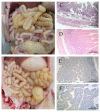Isolation and Identification of Porcine Deltacoronavirus and Alteration of Immunoglobulin Transport Receptors in the Intestinal Mucosa of PDCoV-Infected Piglets
- PMID: 31936476
- PMCID: PMC7019308
- DOI: 10.3390/v12010079
Isolation and Identification of Porcine Deltacoronavirus and Alteration of Immunoglobulin Transport Receptors in the Intestinal Mucosa of PDCoV-Infected Piglets
Abstract
Porcine deltacoronavirus (PDCoV) is a porcine enteropathogenic coronavirus that causes watery diarrhea, vomiting, and frequently death in piglets, causing serious economic losses to the pig industry. The strain CHN-JS-2017 was isolated and identified by cytopathology, immunofluorescence assays, transmission electron microscopy, and sequence analysis. A nucleotide sequence alignment showed that the whole genome of CHN-JS-2017 is 97.4%-99.6% identical to other PDCoV strains. The pathogenicity of the CHN-JS-2017 strain was investigated in orally inoculated five-day-old piglets; the piglets developed acute, watery diarrhea, but all recovered and survived. CHN-JS-2017 infection-induced microscopic lesions were observed, and viral antigens were detected mainly by immunohistochemical staining in the small intestine. The neonatal Fc receptor (FcRn) and polymeric immunoglobulin receptor (pIgR) are crucial immunoglobulin (Ig) receptors for the transcytosis ofimmunoglobulin G (IgG), IgA, or IgM. Importantly, CHN-JS-2017 infected five-day-old piglets could significantly down-regulate the expression of FcRn, pIgR, and nuclear factor-kappa B (NF-κB)in the intestinal mucosa. Note that the level of FcRn mRNA in the intestinal mucosa of normal piglets is positively correlated with pIgR and NF-κB. At the same time, the expressions of FcRn, pIgR, and NF-κB mRNA are also positively correlated in infected piglets. These results may help explain the immunological and pathological changes associated with porcine deltacorononirus infection.
Keywords: NF-κB; Neonatal Fc receptor; Porcine deltacoronavirus; polymeric immunoglobulin receptor.
Conflict of interest statement
The authors declare no conflict of interest.
Figures






Similar articles
-
Isolation, genomic characterization, and pathogenicity of a Chinese porcine deltacoronavirus strain CHN-HN-2014.Vet Microbiol. 2016 Nov 30;196:98-106. doi: 10.1016/j.vetmic.2016.10.022. Epub 2016 Oct 18. Vet Microbiol. 2016. PMID: 27939164 Free PMC article.
-
A Highly Pathogenic Strain of Porcine Deltacoronavirus Caused Watery Diarrhea in Newborn Piglets.Virol Sin. 2018 Apr;33(2):131-141. doi: 10.1007/s12250-018-0003-8. Epub 2018 Mar 22. Virol Sin. 2018. PMID: 29569144 Free PMC article.
-
Genomic characterization and pathogenicity of porcine deltacoronavirus strain CHN-HG-2017 from China.Arch Virol. 2019 Feb;164(2):413-425. doi: 10.1007/s00705-018-4081-6. Epub 2018 Oct 30. Arch Virol. 2019. PMID: 30377826 Free PMC article.
-
[Research Advances in the Porcine Deltacoronavirus].Bing Du Xue Bao. 2016 Mar;32(2):243-8. Bing Du Xue Bao. 2016. PMID: 27396171 Review. Chinese.
-
Porcine deltacoronavirus infection: Etiology, cell culture for virus isolation and propagation, molecular epidemiology and pathogenesis.Virus Res. 2016 Dec 2;226:50-59. doi: 10.1016/j.virusres.2016.04.009. Epub 2016 Apr 13. Virus Res. 2016. PMID: 27086031 Free PMC article. Review.
Cited by
-
Immunogenicity and protective efficacy of a recombinant lactococcus lactis vaccine against HSV-1 infection.Microb Cell Fact. 2024 Sep 9;23(1):244. doi: 10.1186/s12934-024-02517-8. Microb Cell Fact. 2024. PMID: 39252072 Free PMC article.
-
Seroprevalence of Getah virus in Pigs in Eastern China Determined with a Recombinant E2 Protein-Based Indirect ELISA.Viruses. 2022 Sep 30;14(10):2173. doi: 10.3390/v14102173. Viruses. 2022. PMID: 36298726 Free PMC article.
-
Porcine Deltacoronaviruses: Origin, Evolution, Cross-Species Transmission and Zoonotic Potential.Pathogens. 2022 Jan 9;11(1):79. doi: 10.3390/pathogens11010079. Pathogens. 2022. PMID: 35056027 Free PMC article. Review.
-
Endocytosis and Transcytosis of SARS-CoV-2 Across the Intestinal Epithelium and Other Tissue Barriers.Front Immunol. 2021 Sep 7;12:636966. doi: 10.3389/fimmu.2021.636966. eCollection 2021. Front Immunol. 2021. PMID: 34557180 Free PMC article. Review.
-
The recombinant pseudorabies virus expressing porcine deltacoronavirus spike protein is safe and effective for mice.BMC Vet Res. 2022 Jan 4;18(1):16. doi: 10.1186/s12917-021-03115-1. BMC Vet Res. 2022. PMID: 34983523 Free PMC article.
References
-
- Woo P.C., Lau S.K., Lam C.S., Lau C.C., Tsang A.K., Lau J.H., Bai R., Teng J.L., Tsang C.C., Wang M., et al. Discovery of seven novel Mammalian and avian coronaviruses in the genus deltacoronavirus supports bat coronaviruses as the gene source of alphacoronavirus and betacoronavirus and avian coronaviruses as the gene source of gammacoronavirus and deltacoronavirus. J. Virol. 2012;86:3995–4008. - PMC - PubMed
-
- Saeng-Chuto K., Lorsirigool A., Temeeyasen G., Vui D.T., Stott C.J., Madapong A., Tripipat T., Wegner M., Intrakamhaeng M., Chongcharoen W., et al. Different Lineage of Porcine Deltacoronavirus in Thailand, Vietnam and Lao PDR in 2015. Transbound. Emerg. Dis. 2017;64:3–10. doi: 10.1111/tbed.12585. - DOI - PMC - PubMed
MeSH terms
Substances
Grants and funding
LinkOut - more resources
Full Text Sources
Miscellaneous

